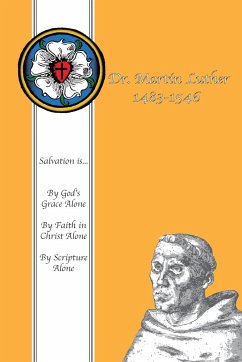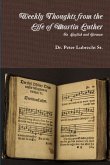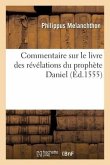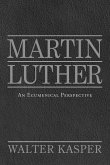Luther and his Bible centered theology came into existence during an approximate 30 year period of time (1517-1546). As leader in the reformation movement Luther not only worked against the Roman Catholic religion which had become synergistic and very legalistic, but he also stood firm against Reformed theology which was sprouting forth with a semi-synergistic theology. (The word synergism is derived out of two Greek words which mean,"working together"(with God) for being converted and being saved in the process of becoming a Christian. This teaching approach stands against a number of Bible passages such as Romans 3:28; 11:6; Ephesians 2:5, 8-9; and others.) This Luther biography offers excellent insights into the life of Dr. Martin Luther and provides good summaries of Luther s main teachings. It presents the Gospel as the Bible doctrine of salvation by the grace of God grace alone, through God-given faith in Christ alone, as taught in Holy Scripture alone. Not only are spiritual leaders, but also our lay members, under continuous bombardment during present the time with the decision theology preaching, false baptism theology and the outright denial of our Savior¿s real presence of His body and blood in, with, and under the bread and wine in Holy Communion. False teaching also keeps being promoted about God's forgiveness of original sin as well as actual sin. Other teachings about the church ban (excommunication), purgatory, praying to saints, the Sacraments, and more, also had needed to be warned against. Not only spiritual leaders, but the laity as well, needed to be properly informed in harmony with the teachings of the Bible. The Bible needed to be translated into their speech. The teachings of our Lutheran Catechism still serve a good purpose in our classrooms and in our BIC classes. But again, how much of such valuable information shows up consistently in daily talk in our families or in personal conversations, even at times within our fraternal get-togethers? We may daily read printed meditations or sections out of the Bible, both of which are highly commendable, but to what extend does the Luther story, in tune with our Lutheran heritage, still play a role in this context? In fact, do we still remember the Lutheran background as being very important? There is an ongoing big need for reliable spiritual maintenance and growth in the hearts of all our brothers and sisters at large. Confirmation dare not be regarded as a mere graduation of a Christian learning process. Our Lutheran high schools pick up some of the slack after confirmation. But what happens after that, and what happens to the rest? A minimal number of high school graduates continue in one of our colleges, and a goodly number of these are trained as future pastors and teachers among us. Thanks be to our God for this! However, many other high school graduates fan out into colleges and universities at large, while at the same time big numbers of others are being absorbed by the labor market. At the same time the prince of this world keeps injecting all kinds of worldly philosophies through the world¿s higher education centers, aimed toward destroying implanted Christian values in our maturing brothers and sisters in faith. Heavy bombardments are being launched against our Savior¿s teachings, either directly or under disguise. Bible teachings are treacherously rendered as outdated traditions, or even as somewhat enhanced legends handed down and expanded with the passing of time.
Hinweis: Dieser Artikel kann nur an eine deutsche Lieferadresse ausgeliefert werden.
Hinweis: Dieser Artikel kann nur an eine deutsche Lieferadresse ausgeliefert werden.








